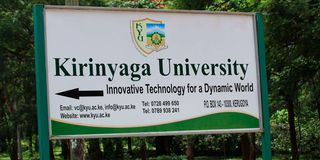
A sign on a road showing the direction of Kirinyaga University.
Since graduating in 2022 with degrees in Health Information Management and Informatics from Kirinyaga University, nine young Kenyans have been unable to find meaningful employment.
Their crime? They lack a practising licence despite having earned a government-sponsored degree from an accredited public university.
What followed were two years of anguish, desperation and finger-pointing.
Four of the nine graduates recently appeared before the National Assembly Education Committee to recount their ordeal.
Among them was Joy Adongo Bwakali, whose father – Wakali Wabuti, a cancer patient from Kakamega – filed a petition to Parliament after losing hope in the university’s willingness to act.
“Wherever they go to look for work, they are asked for practising licences,” he told the team chaired by Tinderet MP Julius Melly.
Mr Wabuti said the biggest heartache is that the students pursued the matter on the relevant professional body that should register them while still training, but the university ignored them or gave unclear answers.
His testimony was echoed by the graduates themselves, who described communication from the university administration as vague.
They said they were left to figure out which professional body was responsible for their licensing – either the Association of Medical Records Officers (AMRO) or the Health Records and Information Managers Board (HRIM).
Both agencies told them that it was the responsibility of the university to initiate the engagement.
“While still pursuing the course, we sent emails to the management of Kirinyaga University. Lack of response compelled us to engage AMRO and HRIM,” said Ruth Wanjiru, one of the students.
“We even pooled money to send a colleague to Nairobi for answers. That’s how desperate we were,” added Raphael Karanja.
For students like Edward Kimaru from Baringo, the pain lies in lost opportunities and feeling abandoned.
“Other students had professional bodies guiding them as they pursued studies while we had no one,” he said.
Adongo’s frustration was heart-wrenching: “We did everything right, including passing exams. We followed up with the university, but no one seemed to care,” she said.
Kirinyaga University, a public institution chartered in 2016, began offering BSc in Health Information Management and Informatics in 2018, admitting 11 students. Nine graduated in 2022, and one the following year. The institution says it adopted the course from Jomo Kenyatta University of Agriculture and Technology, its former parent institution.
According to Vice-Chancellor Mary Ndung’u, the programme was developed in collaboration with AMRO as the HRIM Board did not exist at the time.
“By the time we admitted and graduated the students, HRIM had not been formed,” said Prof Ndung’u.
“We delivered the programme properly, and even paid Sh1.6 million to the Commission for University Education (CUE) for its accreditation.”
The graduates’ woes began with the emergence of the HRIM Board in 2022. The professional body insisted on a formal engagement with the university before it could license the students.
Kirinyaga University says it reached out to HRIM in August and September 2024, January 2025 and in February, only to be met with more bureaucracy.
“They requested the university to fill in a lengthy CUE-style template, and then demanded Sh112,000 to send three board members for an institutional visit,” Prof Ndung’u said.
The university has suspended the programme due to low enrolment but says it is complying with HRIM requirements for the sake of the stranded graduates.
“As to when the process will be completed, only HRIM can answer,” she told the MPs.
Deputy VC Charles Omwandho admitted that wrangles between the CUE and professional bodies contributed to the delay.
“There was push-and-pull between 2017 and 2023, with the court ruling that universities must forward programmes to CUE, which we did in 2017,” Prof Omwandho said.
The MPs demanded accountability and swift action.
“The students have lost time, money and opportunities, so who shall pay them for not being indexed?” asked Mr Melly.
“This is a case of negligence by the university as these students should have been guided. It happens with nursing and clinical medicine students.”
He ordered Kirinyaga University to ensure the students are registered and indexed in a month and to report back to the committee. He also directed that HRIM, AMRO and the CUE be summoned for a joint hearing to end the impasse.





